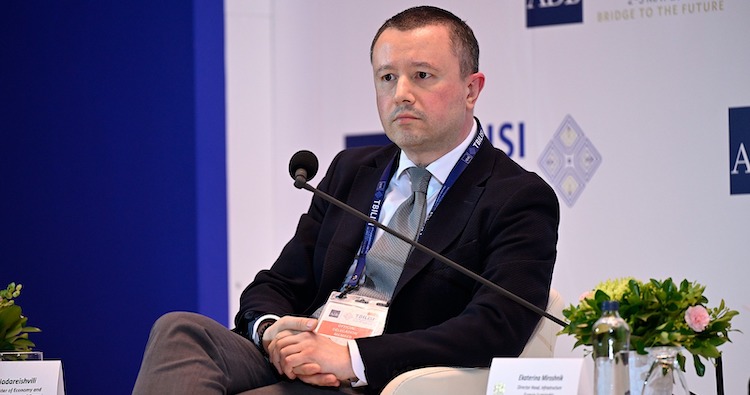Deputy Economy Minister highlights Georgia’s “stable, comfortable, predictable” business environment at ADB annual meeting

Irakli Nadareishvili, the Deputy Economy Minister of Georgia, on Thursday said the country had a “stable, comfortable and predictable” environment for businesses in the country. Photo: Ministry of Economy
Irakli Nadareishvili, the Deputy Economy Minister of Georgia, on Thursday said the country had a “stable, comfortable and predictable” environment for businesses in the country, in comments during a panel discussion within the 57th annual meeting of the Asian Development Bank in Tbilisi.
Nadareishvili highlighted “positive” economic growth forecasts for Georgia with the International Monetary Fund’s projection of a rate of over five percent in the medium term, which he said was due to a “combination of internal and external factors”, as well as the Government’s economic policy and structural reforms.
The Deputy Minister also highlighted challenges that Georgia faced during and after the pandemic and the Government's “successful” s solving of them, the Ministry of Economy said.
He mentioned the country had achieved a double-digit growth in 2021-2022, followed by “continued positive dynamics”. Nadareishvili also told the panel discussion Georgia had received foreign direct investments worth $2 billion in 2022, which amounted to almost eight percent of the gross domestic product - highlighting the number as a “record figure”.
He further noted increased exports and restoration of the domestic tourism industry following the pandemic.
The official also mentioned the development of the Middle Corridor, a logistics route connecting Central Asia and China to Europe via the South Caucasus, and efforts made by the Government for the purpose.
He noted Georgia’s natural location made the country an “essential player” in the Corridor in its linking of “East and West, Europe and Asia”. He also mentioned Georgia was the “maritime gateway to the other side” of the Corridor and provided a transportation route for landlocked countries. The Deputy Minister said a “number of initiatives and activities” were planned for further development of the potential of the route.
He also pointed out the Government’s “successful trade policy” had provided the country with access to “almost one third” of the global consumer market due to free trade agreements and highlighted it as “one of the leading countries” in terms of ease of doing business, noting the World Bank ranked it third for ease of the tax burden.
Nadareishvili also discussed the importance of regulations, rule of law and ease of doing business for enterprises considering Georgia as a location for operations. He mentioned the rate of reinvestment in Georgia was “high” at over 65 percent, which he said indicated businesses were “convinced by their own experience of the reality of the opportunities that the country has to offer”.
Finally, Nadareishvili drew attention to the Government’s business promotion, start-up ecosystem, and capital market development programmes.
 Tweet
Tweet  Share
Share